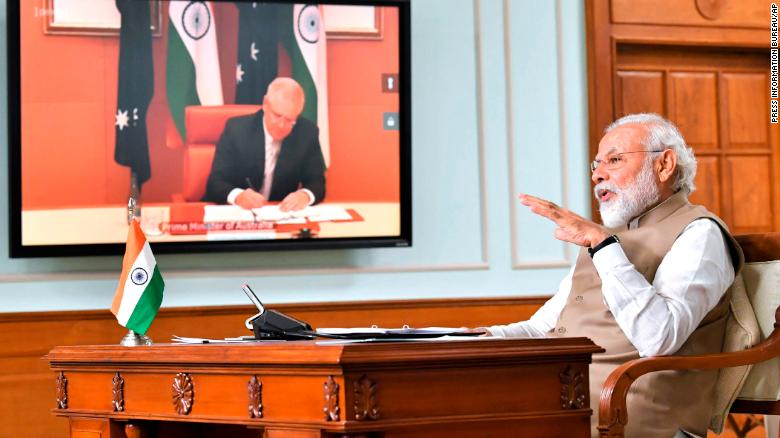
Hong Kong (CNN)India and Australia signed two bilateral military agreements Thursday in the "first step in deepening of the defense relationship" between the two Indo-Pacific powers, according to statements from both countries.
The deals were announced after a virtual summit between prime ministers Scott Morrison of Australia and Narendra Modi of India.
"India is comprehensively and rapidly committed to strengthening its relations with Australia. This is not only important for our two nations but also for the Indo-Pacific region and the whole world," Modi said.
"We are committed to an open, inclusive, prosperous Indo-Pacific and India's role in that region, our region, will be critical in the years ahead," Morrison added.
The new pacts, known as the Australia-India Mutual Logistics Support Arrangement and the Defence Science and Technology Implementing Arrangement, come as military tensions increase in the Indo-Pacific region, which includes in the South China Sea, where China has been fortifying its positions on disputed islands.
A joint post-summit statement said both countries "share a vision of a free, open, inclusive and rules-based Indo-Pacific region to support the freedom of navigation, over-flight and peaceful and cooperative use of the seas."
Indian Prime Minister Narendra Modi speaks during a virtual meeting with Australian Prime Minister Scott Morrison, in New Delhi, India, Thursday, June 4, 2020.
The agreements commit the two countries to deepening military integration through more complex exercises and grant them access to each other's bases for logistical support.
South China Sea
China claims almost all of the South China Sea's 1.3 million square miles as its own, despite other claimants having borders that are far closer to the disputed waters. In 2016, a tribunal in The Hague ruled China has no legal basis to claim historic rights to the bulk of the South China Sea.

Philippines says it won't end US military access agreement amid South China Sea tensions
Australia has long-standing security ties with the United States and has maintained a longtime presence in the South China Sea, conducting airborne surveillance patrols since 1980, according to the Lowy Institute.
Australian warships also visit the area regularly, including participating in exercises there with US warships in April.
Last year, Indian warships joined US, Japanese and Philippine naval vessels in a transit of the South China Sea.
India, meanwhile, has been increasing its defense cooperation with the United States, including with the annual Malabar naval exercises, which bring together the US and Indian militaries along with the Japanese Self-Defense Forces.
The Australian High Commissioner to India, Barry O'Farrell, said in an interview last month that Canberra would be keen on joining the Malabar exercises, but no invite had been extended.
Thursday's signing came as tensions continued to rise on the India-China border in the Himalayan Mountains.
Indian Defense Minister Rajnath Singh said Tuesday that a "significant number" of Chinese troops had moved to the Line of Actual Control separating the two countries.
Last month, an aggressive cross-border skirmish between Chinese and Indian forces resulted in minor injuries to troops. The incident has been followed in recent weeks by unconfirmed reports of tensions in the mountainous area, though neither side had publicly acknowledged anything out of the ordinary.
Source : CNN








No comments:
Post a Comment